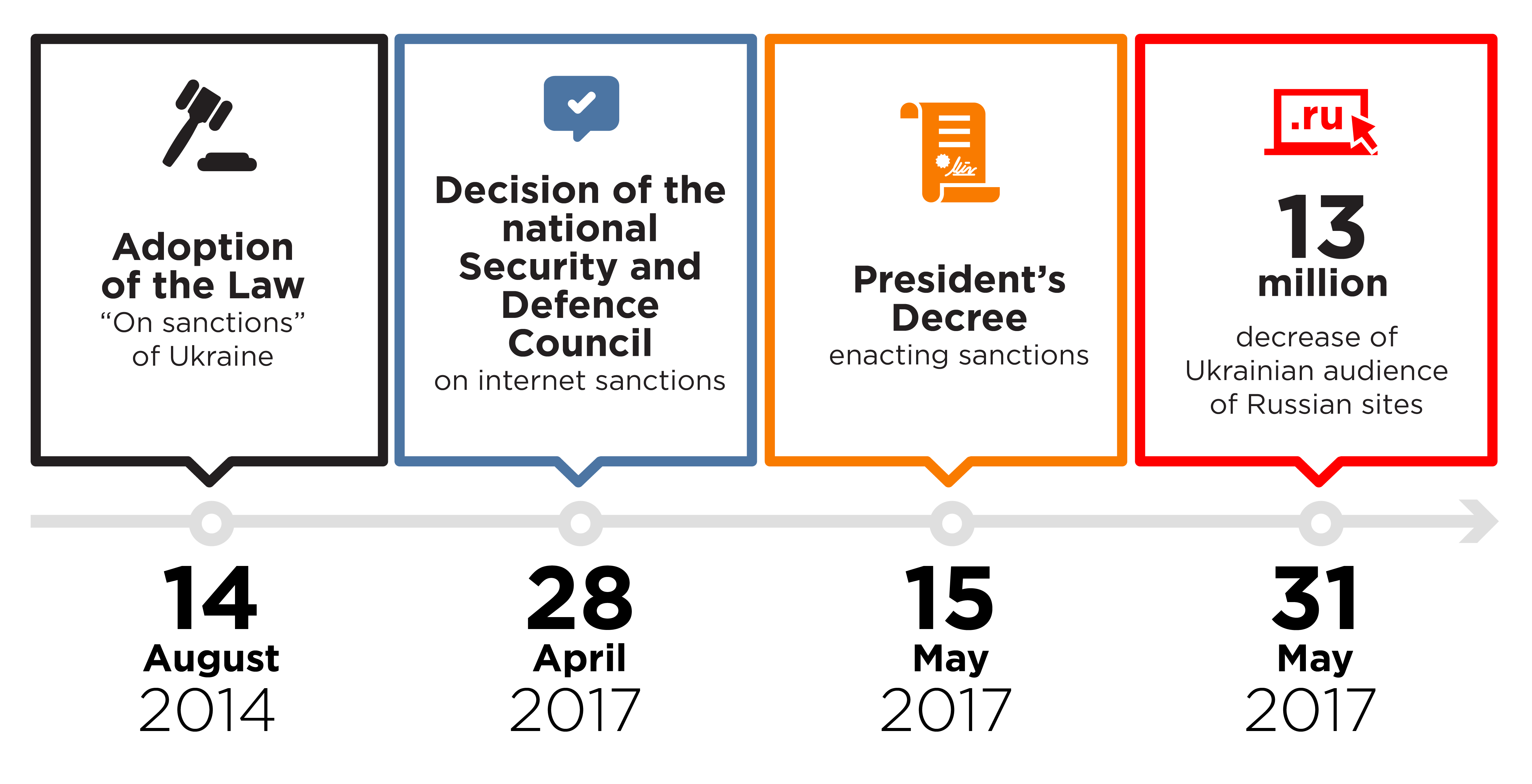DRI Legal News | Issue 1,by Dmytro Koval,Associate Professor in Inteational Law
In May,President Petro Poroshenko passed decree No 133/2017. The decree imposes sanctions on popular Russian social networking resources “Odnoklasniki” and “Vkontakte”,which are used by more than 14.4 million Ukrainians regularly,as well as on a wide range of other online and offline services. In practice,this meant that these services were blocked in Ukrainian territory. The list of sanctioned persons and legal entities was drawn from recommendations of the National Security and Defence Council of Ukraine. The President tried to justify these measures,arguing that they are necessary for Ukraine’s national security against Russian cyberattacks and propaganda. The decree has divided popular and expert opinion in Ukraine.

Restrictions on access to certain inteet resources is not an invention of Ukrainian law enforcement agencies. All states have the legal possibility of blocking or restricting access to certain sites or content. However,these sanctions affect freedom of expression and,according to inteational human rights law,such restrictions should be based on the principle of proportionality and necessity. That is to say a restrictive measure that is imposed must be reasonable and suitable for its specific aim as well as considerate of the competing interests of the different groups involved. The practice of blocking access to (sectors of) the inteet has been criticised by human rights organisations as a violation of the emerging human right to inteet that was recognised by the United Nations Human Rights Council (UNHRC),among others,in a declaration of digital rights in 2016.[1] UNHRC condemns blocking access to inteet if it is not in line with human rights law,and considers it a tool to suppress free expression.
The Ukrainian govement has described the “inteet sanctions” as an economic sanction on Russian business.[2] However,the sanctions on networking services interfere with the freedom of speech. According to Article 10 (2) of the European Convention on Human Rights,the exercise of the right to freedom of expression may be subject to legal limitations in the interests of national security,territorial integrity or public safety. However,the European Court of Human Rights (ECtHR) is strict when interpreting these possible limitations,especially in cases where the freedom is restricted by blocking inteet resources. In line with ECtHR case-law,the ban on inteet resources should have a clearly defined scope and duration. Moreover,ECtHR evaluates the appropriateness of inteet restrictions based on the reasonable proportionality of the measures with regards to the public benefit that is expected.[3] Overall,the Court allows only proportional and necessary targeted banning of online resources for a certain period of time,whereas the general blocking of access to inteet or its segments can only be justified by national security needs,provided that there is “a plausible instrumental relationship between the interference and the social needs pursued”.[4]
The measure has to be legal,which in the Ukrainian case means that the measure has to be based on the Ukrainian Law “On Sanctions”. Taken literally,the Law does not list “restriction of access to the inteet resources” as a type of sanction. Another reading of the Law would be that the banning of inteet services is merely a corollary of sanctions on legal persons,i.e. the providers of these services. When assessing the necessity of the introduced sanctions in the interest of Ukraine’s national security,some question whether they represent an effective solution. Banning certain providers on Ukraine’s territory does not necessarily mean that the users will not be able to access their sites. There are ways to circumvent the ban. For example,individuals can use Virtual Private Networks (VPNs) (as well as proxy servers,mirrors,etc.),which redirect user traffic through other countries.

It appears that this these strategies are being used: after the imposition of sanctions,the blocked Russian websites were suddenly visited by 2 million more users from servers in the US,Germany and the Netherlands whereas the Ukrainian audience decreased by 13 million.[5] Those who criticise the sanctions and consider them to be a political move by the President argue that the ban does not have a significant effect on its supposed objective. However,the fact that the measure does not work perfectly does not mean that it is ineffective.
It is also interesting that according to polls,opinions on the sanctions strongly correlate with the region of respondents: in Weste Ukraine 40% are in favour of sanctions,whereas 67% of respondents in the Southe and 61% in the Easte regions of the country do not support the ban.

[1] See the declaration “The Promotion,Protection and Enjoyment of Human Rights on the Inteet”,27 June 2016
[2] See the preamble of the presidential decree (in Ukrainian)
[3] Case of Morice v. France,Grand Chamber Judgment of 23 April 2015,para. 127
[4] Case of Cengiz and Others v. Turkey,Judgement of 1 December 2015,para. 6
[5] See some data according to LiveInteet (in Ukrainian)
Photocourtesy: Gleb Garanich/Illustration